Historical persons
The most significant historical personalities coming from the Rēzekne municipality

Gustav Manteifelis
Gustav Manteifelis
Gustav Manteifelis (1832 –1916), historian, book publisher, ethnograph, mecenate, author of spiritual songs, born in Dricana Manor. Bibliography fixes 353 Manteiferous works on Latgale and Livonian history, ethnography, geography etc. From 1861 to 1870 MR Manteifel produced ten calendars of “Inflanta Land Release aba Kalenders”, establishing a strong Latgalian calendar tradition, but this work is interrupted by the ban on Latin printing. He prepared an illustrated edition of the Latgale church “Terra Mariana”, presented as a gift to the Pope of Rome in 1888. The first started to collect and publish the Latgalian People's songs. Buried in the garden of the Duchess Church.
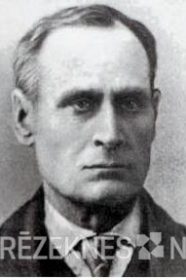
Andrivs Jurdžs
Andrivs Jurdžs
Andrivs Jurdžs (1845 — 1925). Green manor, (present-day Nautre) parish of Kuorklinka, the most prominent representative of Latgale handwriting. In self-training, learn to read and write, learn Russian, Polish, Latin. During the Latin printing ban, more than 20 thick volumes have been written by hand, most of which have died in a fire, the remaining books are kept in the National Library of Latvia and the Latvian Academic Library for rare books and handwriting. Also wrote poetry, aforisms, religious essays, gathering people's songs and proverbs. The dyspnoea Nautrene parish in the tomb of the Desetnaires.
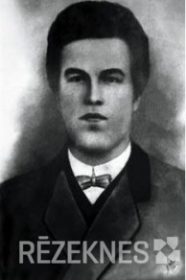
Pīters Miglinīks
Pīters Miglinīks
Pīters Miglinīks (1850 –1883), poet, first human rights defender. Born in the village of Zaļmuiža, Migliniku village. With the help of Baron Rosenshilda Paulin, she stops the Rēzekne county school. Because of the primacy of the Tsara government, it is not possible to work as a teacher, but he does not give up his nationality or the Catholic faith. Serving as a manor writer in Vilnius, McKashans, Zalumma is keenly defending the rights of the peasants, writing poetry, songs that become very popular in the people. In an unprecedented trial against Baron Paulin Rosenshild P.Miglinique, he is a peasant defender and wins. He was killed in the burn of Ria, 11 months in prison in Ludza Prison, where tuberculosis was sick and died at the age of 33. The dyspnoea in the Nautre parish in the desetnament graveyard.
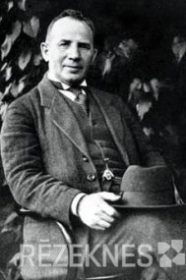
Francis Trasuns
Francis Trasuns
Francis Trasuns (1864 — 1926). The most prominent politician of Latgale, a Catholic clerk, a public employee, a literate. Born in Sakstagala parish in Kolnasat. The primary education was acquired in Jelgava, studied at the Petersburg Catholic Mental seminar, then in the Catholic spiritual academy. At the beginning of the 20 th century, he lived and worked in Petersburg, where he actively encouraged the abolition of the Latvian national awakening and the print ban. MR Tradog was one of the main leaders of Latgale Latvian Congress in Rēzekne in 1917 and supporters of the Latvian independence idea, a member of the Latvian Constitutional Meeting and 1 and 2. Member of the Saeima. He established and chaired the magazine “Friend's friend” (1920) and the newspaper “Zemgalka Bolss” (1924-1926). As a result of various political disagreements and intrigues, MR Trassun, despite being popular in the people and doing much for the church, was excluded from the Catholic Church in 1926. In the same year he dies from a heart attack and is buried in the tombs of Rezekne's brothers. Only in 1998 did the Congregation of Church Clare officially admit that the expedition against F. Trassu, which had been achieved by local church men, had not been fair and the Vatican gave the priest his good name.
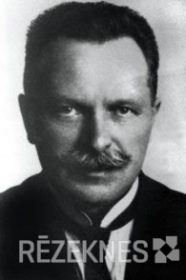
Francis Kemps
Francis Kemps
Francis Kemps (1876 — 1952). Born in Makashan parish in Sprudzev (present-day Griškanu civil parish). Latgale awakening employee, one of the founders of Peterpils Latvian Musical Society (1903), first Latgale newspaper “star” (1902 – 1903) and “light” (1905 –1906), editor and editor of the newspaper “Austra” (1908). Historic work on Latgale Latvian past “Latgalians” (1910) and “Latgale fate” (1938). The first head of the city of Rezekne during the Latvian Free State, the Constitutional Meeting and the Saeima deputy, a member of the Minister for Transport (1928 –1931). In 1949, he was deported to Siberia, died in Tomsk district, in 1991, in his homeland, in the graves of Zvirgzden.
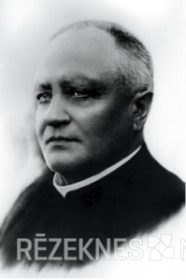
Monsignor Nikodems Rancāns
Monsignor Nikodems Rancāns
Monsignor Nikodems Rancāns (1870 — 1933). Despite his father's death, the family moved to Zaļmuiža parish, the mother of Nicodema's mother Anne Rananes. Migliniece) homeland. The clerk, literate, educator, one of the most important employees of Latgale awakening in both the early 20 th century in Petercastle and Latgale. In 1906, one of the first Latgalian newspapers “Home” is issued. Working in Rēzekne for decane, N. Ransen creates a parish school in 1907, where the children of Rezekne District can first learn Latvian. Founder of the Rēzekne Trade School (1907), a founder of the Greychen Agricultural School (1910), Director of the Rēzekne State Teacher Institute (1929 –1933). More than twenty-long and spiritual author of books, learning tools and translations. Resting in Rēzekne, in the graves of peace.
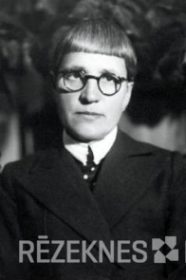
Valerija Seile
Valerija Seile
Valerija Seile (1891 — 1970). Significant Latgale education worker, bibliography, scientist. Born in McKashan parish in Seychelles (now Audrinu civil parish). The first woman in Latgale who has received academic education. Working as a teacher in Rezekne, he was an inspector of the Rēzekne County Schools, a member of the Latvian People's Council and the Constitutional Meeting, a member of the Minister of Education in Latvia in 1922. He was the director of the Daugavpils National Teacher Institute for seventeen years. The only woman who participated in the organizing of the historical Latgale Congress. She was awarded a three-star order in 1940. Buried in the Catholic graves of Daugavpils.
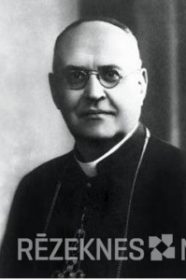
Bishop Joseph Rancans
Bishop Joseph Rancans
Bishop Joseph Rancans (1886 — 1969). Born in Nautrene parish Livzeniekos. An employee of the first Latgale awakening in Petercastle and Latgale, a member of the Council of Transitional Land of Latgale, a member of the Council of the People's Council, a member of the Constitutional Meeting, a member of the Saeima of all Latvian Saeima, a member of the Saeima until 1940. On September 9, 1944, Gestapo was forced to exile with other Latvian bishops. As well as living in Germany and THE US, the Latvian People's Rights has been defended, informs about the fate of occupied Latvia, visiting prominent leaders of the European Church, statesmen, Allied occupation army blanks. Rewarded with the three-star order of the second class. Died IN THE US, a 1991 overburied Aglona basilica script.
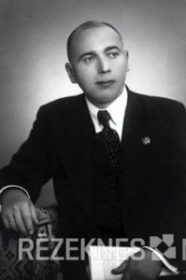
Anton Rupainis
Anton Rupainis
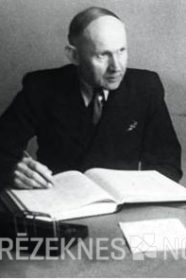
Boļeslavs Brezhgo
Boļeslavs Brezhgo
Boļeslavs Brezhgo (1887 – 1957). He was born in Drucana parish. The greatest historian of Latgale, the first professional Latvian historian in Latgale. Graduated from the Moscow Archaeological Institute, where he obtained a degree in professor degree. The author of several important historical research on Latgale. On the book “Latgale farmers 1772 – 1861” He was awarded a PhD degree from the University of Brussels. It is the first study of the history of Latgale farming, which has not lost its significance today. Resting in Riga, I in the forest graves.
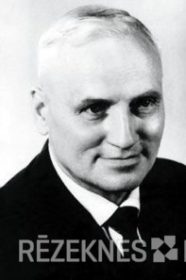
Vladislav Lōcis
Vladislav Lōcis
Vladislav Lōcis (1912 — 1984). Writer, the most prominent publisher of Latgalian books. Born in the village of Dricana in Lōči village. In 1939 he established a publishing house in Daugavpils, where the most brightest works of Latgalian literature were issued. In 1944 he went in exile to Germany, where he continued his work until the end of his life. The most important expenditure of the article is “Olūts”, “Trent Land Calendar”, the newspaper “Latgola”, “Latgola bolus”, the magazine “dzeive”. Overburied in Pilcene graves.
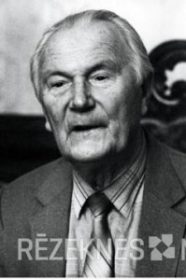
Jānis Klīdzējs
Jānis Klīdzējs
Jānis Klīdzējs (1914 –2000), writer, member of the three-star Order, member of the Union of Latvian writers, honorary member of the Latvian Academy of Sciences. Born in Vilnius parish in Kurpniekos (now Rikavas civil parish). More than 20 books - the author of novels, stories, outlets, the most popular – “young people”, “Gothybird life”, “snow”, “gifted souls”, etc. After the novel's “human child”, the first film is taken in Latgalian language “Cyllida Barns” (director Janis Streich), the art film also after the novels of the novel “snow”. Dead in California, USA, buried in the Cantalian graveyard.
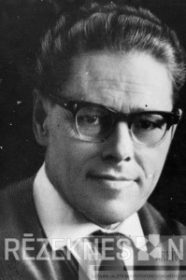
Janis Gleizds
Janis Gleizds
Janis Gleizds (1924 –2010) photomartists, three-star ordeņa, EFIAP, a permanent member of the “Riga” photoclub “Riga”. He was born in the Parish of Rēzekne (now Ilzeskalna) in Vecgailumi. The photograph had been running since 1951. Although he had lost both hands in his early youth, he achieved great success in the photomart, participating in many exhibitions in Latvia and beyond. Jānis Gleizda was awarded AN AFIAP (1979) and AN EFIAP (1988) title. Mostly John Gleisd worked in the black-and-white photograph using the complex isohelical technique. Perhaps the most widely known photographs of John Glazda's women's acts, but he also acted in other genres – landscape, quiet nature, portrait photography.
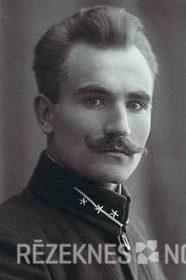
Stanislav Kambala
Stanislav Kambala
Stanislav Kambala (1893 – 1941). A public employee. Born in Rēzekne District, Kuļņevas parish (now Lendzu civil parish). Participated in the organisation of the Latvian Interim Council. As the sole representative of Latgale, he participated in the formal act of the Republic of Latvia on 18 November 1918. A member of the Secretary-General of the People's Council. 1919. In October of the year, as representative OF the Council of the People'S Council, MR Zalis, the Latvian delegation headed BY Z. Meierovica, was sent to Poland and Lithuania in search of aid for the fight against Bermont troops. From 1920. Member of the Constitutional Meeting of May, Vice-President OF the Constitutional Meeting II. Participated in the establishment of Latgale Farmers Party. Created and up to 1920. He directed the newspaper “Latgalites”. From 1923. Member of the Council of the Latvian Bank of Latvia. 1925 - 1926 - Managing director of Latgale stock bank, Member of the Board of Latvia. Later economic employee, owner of Liten mill. In addition to the public and political activity, Stanislav Kambala has been an active publicist, also published with pseudonym. He also worked as a linguist – in 1918, his work “Overview of the Latgalian Spelling Consultation”, 1921 and 1922, “Latgalian volumic grammar”. He received the Order OF the three Star IV of Latvia for his merits. Died in Riga in December 1941. Buried in Riga St. Michelel's grave.
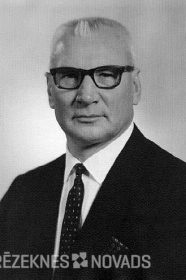
Konstantin Počs
Konstantin Počs
A member of the Second World War (15 th Latvian Legion Division).
Finished the Aglona Gymnasium.
Brothers Danube, Janis Potch, Eduard and Sister Antonin.
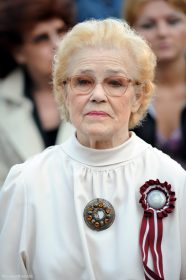
Theresia Broka (b. Sadurska)
Theresia Broka (b. Sadurska)
Born on September 30, 1925, in Rēzekne District, Vilnius parish, a multi-child family of Zvīdreņu villages. In 1934, T. Brok started training at the wildlife elementary school, sanctioned in schools and church trees. After the graduation of the primary school in 1940, Rezekne entered the 1 st High School, graduated in 1946. That year she entered the High School of Rēzekne. In 1949, T. Brok was in the National Conservatory of Latvia. After the end of the Conservatory – from 1954 until 2000, the only basic place of work – Daugavpils High School, where he performed the pedagogical and educational work in the Cordirigent Division. Many of her students today work as singing teachers in general educational schools, perform pedagogical work in secondary and higher education institutions, are active cultural employees, manage self-activity choir collective and student choirs in many cities and rural areas of our Republic, especially in Latgale.
In parallel with the pedagogical work, there was also a continuous work on public work, leading to self-acting chores, ensembles, actively engaging in the organisation of their own celebrations and other events.
The festival of Latgale is a celebration of the songs of songs, teacher Cora, and VII school youth song festival superconductor, as well AS XX, XXI, and XXII general Latvian song festival general conductor.
Daugavpils District People's Cori “Latgale” participated in many events organised by the People's Art Centre: Latvian Component Remembrance in Song Days, Teacher Falls, Nordic Song Festival in Sweden, Norway.
Awards: Latvian National Artistic Worker (1977); Latvian People's stage artist (1986); three-star Order (1995); Ministry of Culture's Prize in the People's Arts and Spidola Prize (1998); Great Music Award (2003); Honorary diploma and prize of the Cabinet of the Republic of Latvia (2005); Honorary Dunavpils – diploma (2005).
In 2013, T.Brokai awarded the Latgalian cultural year “Boņuks” for a life contribution to Latgalian culture.
In 2015, he was awarded the Daugavpils City Council Prize for Life.
MR Broka died at the age of 93 on 22 October 2018, buried in Daugavpils Brothers' graves.
In the end of 2018, an artist's life and the book of Anne Ranance, “Azara bolti barzi …”, came up.